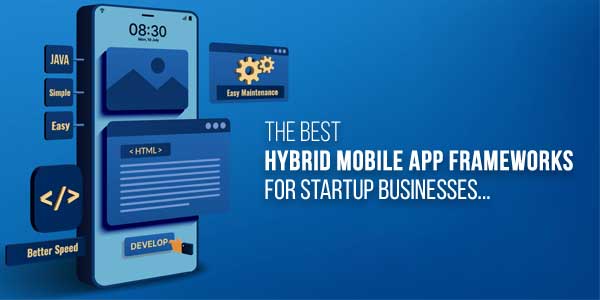
If you’re a startup business owner seeking to develop a mobile app that enhances customer experience, the vast array of options available in the market can be overwhelming. Selecting the right hybrid mobile app framework is crucial for your venture’s success. This article will delve into the top choices for hybrid mobile app frameworks that are especially suitable for startup businesses, equipping you with the necessary information to make an informed decision.
Table of Contents
Understanding Hybrid Frameworks:
Before delving into specific frameworks, let’s first grasp the concept of a hybrid mobile app framework. In simple terms, a hybrid app is built using web technologies such as HTML, CSS, and JavaScript, and then packaged in a native container. This allows the app to operate on multiple platforms, like iOS and Android, while utilizing a single codebase.
Benefits Of Hybrid Frameworks For Startup Businesses:
When it comes to startup businesses, time and resources are often limited. Hybrid frameworks offer several advantages that make them an enticing choice for startups. Here are some key benefits:
- Cost-effectiveness: Developing separate apps for each platform can be costly. Hybrid frameworks enable you to create a single codebase that runs on multiple platforms, saving both time and money.
- Accelerated development: Hybrid frameworks facilitate rapid development by leveraging web technologies. Developers can write code once and deploy it across various platforms, significantly reducing development time.
- Simplified maintenance: With a unified codebase, maintaining a hybrid app becomes streamlined. You can update the app’s features and fix bugs without the hassle of updating multiple app versions.
Now that we comprehend the advantages of hybrid frameworks for startup businesses, let’s explore some of the top choices available in the market:
Framework Architecture:
When evaluating hybrid frameworks, it’s crucial to assess their architecture as it determines scalability, performance, and flexibility. Here are some popular framework architectures:
- Model-View-Controller (MVC): This architecture separates the app’s data, presentation, and logic into three distinct components, enhancing code organization and maintainability.
- Model-View-ViewModel (MVVM): MVVM segregates the business logic and the view, facilitating easier testing and code reusability.
- Model-View-Presenter (MVP): MVP, similar to MVC, emphasizes the separation of concerns between the view and the presenter.
Understanding the architecture of different frameworks will assist you in making an informed decision based on your specific requirements.

1.) React Native:
React Native, developed by Facebook, is a popular hybrid framework that utilizes JavaScript and React to construct native-like mobile apps. React Native offers several advantages for startup businesses:
- Enhanced Performance: React Native enables faster app performance by directly rendering UI components on the device’s native APIs. This results in smoother animations and improved user experiences.
- Robust Community: React Native boasts a vast and active community of developers who contribute to its development, ensuring continuous improvements and support.
- Code Reusability: React Native facilitates code sharing among platforms, reducing development time and costs.
2.) Flutter:
Flutter, created by Google, is another powerful hybrid framework that employs Dart as its programming language. It adopts a unique approach to building mobile apps. Here’s why Flutter stands out:
- Rapid Development: Flutter’s “hot reload” feature allows developers to witness real-time changes, expediting the development process.
- Stunning UI: Flutter provides a comprehensive range of pre-built UI components, known as widgets, that aid in crafting visually appealing and customizable user interfaces.
- Single Codebase: With Flutter, you can construct apps for both iOS and Android using a single codebase, saving time and effort in maintaining separate codebases.
3.) Ionic:
Ionic, widely adopted by hybrid framework users, employs web technologies like Angular and TypeScript. It is renowned for its simplicity and user-friendliness. Here are some reasons why startups opt for Ionic:
- Cross-platform Compatibility: Ionic allows you to develop apps that can operate on various platforms, including iOS, Android, and even the web.
- Extensive Plugin Ecosystem: Ionic offers a wide array of plugins that enhance app functionality, encompassing features like maps, social sharing, and push notifications.
- Responsive Design: Ionic’s CSS-based components are designed to be responsive, ensuring that your app looks impeccable on different screen sizes.
In conclusion, choosing the best hybrid mobile app framework for your startup business is a critical decision. By considering factors such as framework architecture, performance, community support, and ease of use, you can make an informed choice. React Native, Flutter, and Ionic are all exceptional options that offer unique features and advantages. Explore their documentation, experiment with sample projects, and select the framework that aligns with your business goals. Remember, the right framework can unlock the success of your startup mobile app.
Final Thoughts:
We hope this blog will help you choose the right framework to improve your hybrid app development projects and enhance your digital presence. While each of them offers a unique bouquet of benefits, the selection of framework depends upon your business vision and app requirements.














Be the first to write a comment.